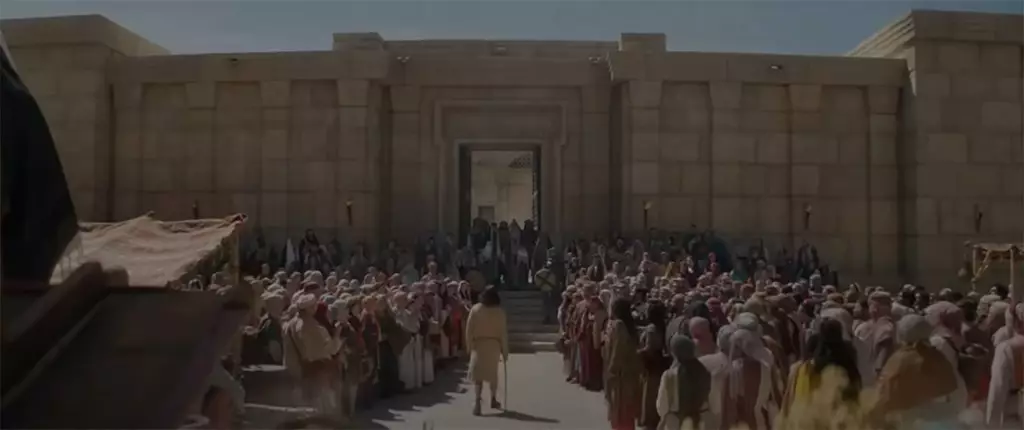Modern cinema is witnessing a fascinating trend as more unconventional narratives and diverse storytelling strategies gain traction. Fathom Entertainment’s recent success with “The Chosen” serves as a remarkable case study, illustrating not just the power of well-crafted storytelling but also the socio-political undercurrents that guide moviegoer preferences. As part of its fifth season, particularly parts one and two, “The Chosen” has managed to capture the top spots in the weekend box office, raising questions about faith-based cinema’s growing influence.
Audiences Crave Connection: The Human Element
At its core, “The Chosen” thrives on the real-life experiences and emotional heft of its characters. Unlike many commercial blockbusters that often prioritize spectacle over substance, this series dives deep into the lives of its characters, presenting nuanced portrayals that resonate with its audience. The element of community and connection fosters a shared experience among viewers; it’s a movie you go to with family or friends, where laughter and tears become collective, as described by Blue Harbor Entertainment regarding their new release, “A Nice Indian Boy.” It’s crucial to recognize that audiences are not merely after entertainment; they are, increasingly, yearning for stories that touch the human spirit.
The Rise of Faith-Based Content: A Socio-Political Commentary
The growing popularity of faith-based narratives, exemplified by “The Chosen,” raises an intriguing political discourse. In an era dominated by cynicism and profoundly divisive political ideologies, this series offers comforting reassurance to those seeking positive representations of faith. It caters to a demographic—often overlooked by mainstream cinema—that not only values spirituality but finds solace in its celebration. While center-right liberalism grapples with capitalism’s moral dimensions, the success of such productions may signal a broader swing in cultural values, suggesting that audiences are increasingly open to exploring spirituality through a cinematic lens.
Community Engagement: A Crucial Component
The strategy of organizing “binge fests” signifies a robust engagement with the existing community around “The Chosen.” By creating an interactive element, where fans can enjoy multiple episodes in one sitting, Fathom Entertainment nurtures a communal experience that traditional viewing methods often lack. Not only does this method solidify the series’ fanbase, but it also encourages social gatherings that strengthen community bonds. In a cultural landscape where individualism often prevails, these communal viewing experiences signal a yearning for belonging—something that current societal conditions sorely lack.
Box Office Trends: The Power of Diversity in Storytelling
Interestingly, alongside the success of “The Chosen,” other titles like the queer romantic comedy, “A Nice Indian Boy,” reflect an expanding appetite for diverse storytelling. The combined box office metrics suggest that audiences are not confined to a single narrative style; rather, they crave variety that reflects their multifaceted realities. The fact that “The Chosen,” a faith-based series, can coexist alongside more diverse narratives demonstrates that the box office can be a space where various stories find their rightful place, catering to sometimes conflicting values and beliefs.
The Evolving Indie Landscape
Long overshadowed by mainstream cinema, independent filmmakers are now carving their niches, showcasing how personal storytelling can resonate on large platforms. Films like “Hell of a Summer” and “The Luckiest Man in America” indicate a vibrant indie scene driven by unique perspectives and authentic narratives. In part, this flourishing dynamic reflects the marketplace’s reaction to the cookie-cutter blockbusters that often dominate theaters, and serves as a reminder that there is an audience that still values originality.
Countering Negativity in Media: A Form of Resistance
As the news cycle remains inundated with negativity, it’s worth examining how “The Chosen” acts as a form of cultural resistance against the pervasive pessimism. By sharing positive stories that focus on love, sacrifice, and faith, “The Chosen” challenges the monotony of mainstream media’s cynical storytelling. This isn’t merely escapism; it’s a response to current realities where divisive narratives prevail. The box office’s embrace of such films reflects a collective yearning for narratives that uplift rather than drag audiences further down.
While traditional cinema often struggles with how to connect with modern audiences, “The Chosen” exemplifies how deeply resonant stories are not only commercially viable but critical in shaping current cultural dialogues. As we look ahead, the balance between diverse storytelling techniques and heartfelt narratives will become essential in determining film’s role within society. In a world craving genuine connection, the success of such stories shines brightly, hinting at a stirring shift toward more meaningful cinematic experiences.

